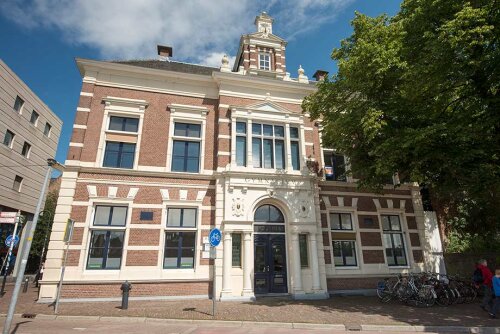Best Collaborative Law Lawyers in Delft
Share your needs with us, get contacted by law firms.
Free. Takes 2 min.
Free Guide to Hiring a Family Lawyer
List of the best lawyers in Delft, Netherlands
About Collaborative Law in Delft, Netherlands
Collaborative law is a voluntary, structured process for resolving disputes outside of court. It is used most often in family matters - for example divorce, parenting arrangements, and division of assets - but can also apply to some business and inheritance disputes. In Delft, as elsewhere in the Netherlands, collaborative law brings the parties together with their own collaboratively trained lawyers and, where appropriate, neutral experts such as financial specialists or child specialists. The goal is to reach a negotiated settlement that is practical, durable, and tailored to the parties needs - avoiding the adversarial court process when possible.
Why You May Need a Lawyer
People commonly seek a collaboratively trained lawyer when they want legal support but prefer a cooperative, non-litigious path. Typical situations include:
- Divorce or legal separation where spouses want to keep negotiations private and constructive.
- Agreeing on parental authority, custody and visitation with a focus on children well-being.
- Negotiating partner or child maintenance - establishing fair, sustainable financial arrangements.
- Dividing shared property, businesses, pensions, and debts in a clear way that fits Dutch property regimes.
- Settling inheritance disputes or disagreements between family members without going to court.
- Resolving certain commercial disputes where parties prefer a negotiated outcome and want to preserve ongoing relations.
In each case a collaborative lawyer assists with legal advice, prepares documents, ensures full financial disclosure, and negotiates toward a settlement that can be formalized in a legally binding agreement or, where needed, in the relevant formal instruments such as notarial deeds.
Local Laws Overview
Collaborative law in Delft operates within the framework of Dutch civil and family law. Key local and national law aspects to be aware of include:
- Matrimonial property regimes - The Netherlands recognises different regimes, such as statutory community of property for marriages without prenuptial agreements, and huwelijkse voorwaarden when spouses have specific agreements. How assets and debts are divided depends on the chosen regime.
- Divorce procedure - In Dutch law a divorce requires a judge to dissolve the marriage, or a mutual petition. Collaborative settlements can be converted into court files or implemented by agreement, but a formal divorce decree is still obtained through the court if you seek legal dissolution.
- Child custody and parental authority - Dutch law prioritises the childs best interests. Agreements on custody and parenting time reached collaboratively must respect statutory principles on parental authority and may need court registration in some situations.
- Maintenance rules - Child support (kinderalimentatie) and spousal maintenance (partneralimentatie) follow statutory formulas and case law. Collaborative agreements must satisfy legal minimums and be realistically enforceable.
- Notarial formalities - For certain transfers of property, mortgage matters, and some inheritance arrangements, a notary and notarised deed are required under Dutch law.
- Registration and municipal matters - Changes affecting address, parental authority, or civil status must be updated in local registers such as the Basic Registration Persons - BRP - maintained by the Municipality of Delft.
- Confidentiality and disclosure - Collaborative processes emphasise open disclosure, but parties and lawyers remain bound by professional rules and legal obligations, including mandatory reporting in some criminal matters.
- Legal representation rules - Collaborative lawyers must be members of the Dutch Bar - the order of advocates - and many hold additional collaborative law training. A standard feature of collaborative processes is the commitment that if negotiation fails, the collaborative lawyers withdraw so that parties obtain fresh representation for litigation. This practice preserves the cooperative atmosphere.
Frequently Asked Questions
What exactly is collaborative law and how does it work?
Collaborative law is a structured negotiation process where each party has their own collaboratively trained lawyer. All participants sign a participation agreement committing to resolve the dispute without going to court. The process commonly includes joint meetings, full financial disclosure, and optional neutral experts. If the process succeeds, the settlement is put into a legally binding agreement. If it fails, the collaborative lawyers typically withdraw and the parties obtain new lawyers for litigation.
How does collaborative law differ from mediation?
Both are alternatives to court, but in mediation a neutral mediator helps the parties negotiate and the mediator does not represent either party. In collaborative law each party has their own lawyer who advises them and negotiates on their behalf in the cooperative setting. Collaborative law often involves a team approach with financial specialists or child specialists, while mediation is usually led by a single neutral facilitator.
Do I need a collaboratively trained lawyer in Delft?
To use the collaborative law model properly it is best to work with a lawyer trained in collaborative practice. They understand the process, the participation agreement, and the ethical commitments involved. In Delft you can look for local lawyers who state collaborative law as a specialisation or who are affiliated with national collaborative law networks.
Is a collaborative agreement legally binding?
Yes. A collaborative settlement agreed in writing can be made legally binding by converting it into the appropriate legal instrument - for example a court-approved parenting plan, a notarial deed for property transfers, or a settlement agreement signed by the parties and their lawyers. Parties should ensure the agreement meets legal requirements for the subject matter involved.
What happens if the collaborative process breaks down?
The standard collaborative protocol requires the collaborative lawyers to withdraw if the process fails. This protects the cooperative process but means you will need to instruct new counsel if you proceed to litigation. The idea is to encourage genuine commitment to settlement, but it also means parties should be prepared to continue negotiating or obtain new lawyers if agreement is not reached.
How much does collaborative law cost in Delft?
Costs vary by lawyer and the complexity of the case. Collaborative work typically charges lawyers on an hourly basis or a capped fee. Because the process aims to avoid prolonged litigation, total costs can be lower than going to court, but that depends on the number of meetings and specialists involved. Ask for a clear fee estimate and an explanation of how costs will be shared or allocated between parties at your first meeting.
Can collaborative law handle urgent matters, like temporary child living arrangements or urgent financial needs?
Yes. Collaborative teams can arrange interim agreements addressing urgent needs while the main negotiations continue. These arrangements should be clear, time-limited, and legally documented so they protect childrens interests and financial necessities while a final settlement is negotiated.
Is the collaborative process private and confidential?
Collaborative meetings are private and participants usually agree to confidentiality for settlement discussions. However confidentiality is not absolute - lawyers have legal and professional duties that may require disclosure in certain situations, for example where there is a risk of harm to a child or criminal conduct. Confidentiality also does not prevent the eventual settlement from being formalised in public documents if legally required.
Can one party force the other to use collaborative law?
No. Collaborative law is voluntary. Both parties must agree to participate and sign the participation agreement. If one party does not want to participate, other dispute resolution options include mediation, negotiation through lawyers without a collaborative agreement, or court proceedings.
How do I find a collaborative lawyer in Delft and what should I ask at the first meeting?
Look for local family law or civil lawyers who mention collaborative practice, collaborative training, or memberships in collaborative networks. At the first meeting ask about their collaborative training and experience, fee structure, how they handle disclosure, the expected role of any neutral experts, and what will happen if the process does not reach agreement. Also ask whether they have experience with the specific Dutch legal matters you face, such as huwelijkse voorwaarden, partneralimentatie or property division.
Additional Resources
Below are types of local and national resources that can help you find information and support in Delft:
- The Dutch Bar - the professional body for advocates - for information about finding a licensed lawyer and understanding professional rules.
- Juridisch Loket - a national legal aid desk offering initial free legal information and guidance for people with limited means.
- Raad voor Rechtsbijstand - the Council for Legal Aid in the Netherlands - for information on eligibility for government-subsidised legal aid.
- Mediator and collaborative associations - organisations that certify mediators and collaborative practitioners can help you find trained professionals.
- Municipality of Delft - local family and social services, registers and practical steps for changes to civil status.
- District Court handling family law matters for the region - for procedural information if court involvement becomes necessary.
- Notaries in Delft - where you may need formal deeds for property transfers and certain agreements.
Next Steps
If you are considering collaborative law in Delft, follow these practical steps:
- Gather key documents - proof of identity, marriage certificate, financial records including bank statements, mortgage documents, tax returns, pension statements and any prenuptial agreements.
- Talk with the other party about pursuing collaborative law - the process requires mutual agreement and commitment.
- Contact a collaboratively trained lawyer for an initial consultation - ask about experience, fees, and the collaborative participation agreement.
- Prepare to provide full financial disclosure - transparency is central to a successful collaborative process.
- Consider whether neutral experts would help - financial specialists, child specialists, or tax advisers can be engaged jointly to provide neutral input.
- Decide on logistics - how meetings will be scheduled, the anticipated timeline, and how costs will be handled.
- If you have limited income, check eligibility for legal aid through the Raad voor Rechtsbijstand or seek initial guidance from Juridisch Loket.
- Keep the childrens best interests front and centre when family matters are involved - collaborative law is designed to promote solutions that reduce conflict and support long-term family functioning.
Collaborative law can be an effective option for people in Delft who want a respectful, practical, and private route to resolving disputes. Speaking early with a collaboratively trained lawyer will help you understand whether the process fits your situation and how to move forward.
Lawzana helps you find the best lawyers and law firms in Delft through a curated and pre-screened list of qualified legal professionals. Our platform offers rankings and detailed profiles of attorneys and law firms, allowing you to compare based on practice areas, including Collaborative Law, experience, and client feedback.
Each profile includes a description of the firm's areas of practice, client reviews, team members and partners, year of establishment, spoken languages, office locations, contact information, social media presence, and any published articles or resources. Most firms on our platform speak English and are experienced in both local and international legal matters.
Get a quote from top-rated law firms in Delft, Netherlands — quickly, securely, and without unnecessary hassle.
Disclaimer:
The information provided on this page is for general informational purposes only and does not constitute legal advice. While we strive to ensure the accuracy and relevance of the content, legal information may change over time, and interpretations of the law can vary. You should always consult with a qualified legal professional for advice specific to your situation.
We disclaim all liability for actions taken or not taken based on the content of this page. If you believe any information is incorrect or outdated, please contact us, and we will review and update it where appropriate.









